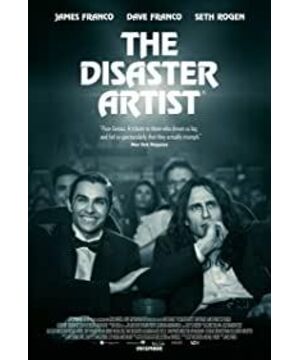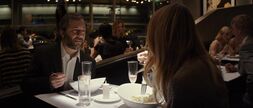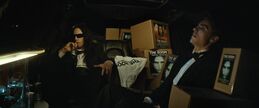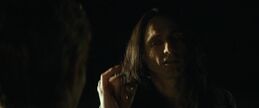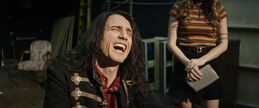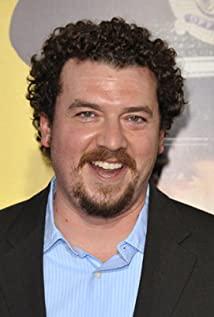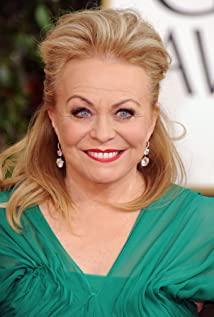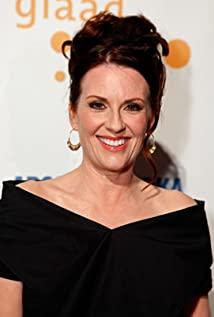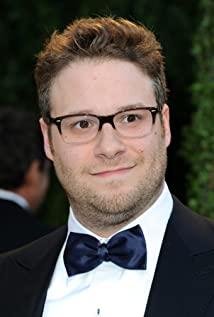No careful planning, superb skills. The clumsy narrative is as simple as first love: I don't know how to please, but I have a sincere heart, pursue you, pursue you, until I slowly touch you, because I have a heart that wants to become better, of course I can't hope You understand me, love me, and spend the rest of my life the way I want.
For me, this movie has nothing to do with failure or success. It is different from "The room" in front of the stage. It is more like an experience that is spread out in front of you. To appreciate the place you want to appreciate, it is standing in "The room". "The woman behind, Being sentive also supportive.
In the movie, there is a cult scene where the actors talk about the meaning of "The room" at lunchtime, and the whole movie "The disaster artist" interprets it.
"The room" describes Wei Su's life, a life that can be said to be tragic, but the betrayal in the story has caused countless laughter and laughter, just like in the movie, when Gray and Wei Su were talking about serious topics, Wei Su Laughs and replies: "It's a natural human reaction." For this passage, I have the following interpretation: There are countless people in this world with very different personalities. Everyone has an unforgettable experience and feels that he has a story that touches the world. But the tricky thing is that not everyone is like you, struggling and roaring because others don't understand the darkness you're going through.
Just like Wei Su's laughter, as an audience, we smile at the other side of your life, which is our own interpretation, and it is also a natural reaction. The above is also the core of "The Cataclysm": be 100% yourself, and leave the rest to the audience.
---
In recent years, there have been many films describing the film industry itself. After struggling to find a good story, Hollywood stars turned around and found that their own experience was the best script. "The disaster artist" is like this. If "The room" is Wei Su's attempt to describe his life, then "The disaster artist" uses the east wind to describe the director's own vision.
I can't define what genre this movie belongs to, whether it's a comedy or a tragedy, like Shakespeare's Hamlet, everyone can read a different life. As the director of this film, James focused a lot on constructing the contradiction between Wei Su and the people around him, and in the end he subtly resolved them: all the people around Wei Su didn't understand him, but in the end, he contributed to "The room" laughed heartily. Wei Su himself felt that the people around him did not understand him and could not understand the Vision in his heart. He felt hoarse and pessimistic about the past, but it became the laughing stock of everyone. He also cried, but in the end he also stood in front of the stage proudly and received applause, for which he even lied.
Fxxk that, there is no clumsy and insurmountable hurdle in the world, only those who stay in front of the hurdle forever, take care of their overseas Chinese feelings, and be an optimistic and popular golden boy, because no one likes emotions that do not belong to them .
---
In fact, "The disaster artist" also has a good story like "The room", but the technique of the movie still cannot perfectly present the story itself.
I just finished watching "Three Billboards" before watching this movie. Compared with its stable narrative shots, "The disaster artist" uses a lot of handheld shots and fast cut mirrors in the first part. The rhythm makes it difficult for me to quickly integrate into the theme. . But what is remarkable is that in the hoarse "Train Named Desire" performance in Wei Su's performance class, the deep soundtrack, the fast-paced handheld mirror and the cut mirror conversion, gave a long-range fixed machine. It gave me a bystander's perspective of watching life inside and outside the theater. While there are still plenty of handheld shots in the subsequent parts, the previous scene has brought me into the preset God perspective, which is a very good switch.
What’s equally brilliant and extra points is that when Wei Su and Gray arrived in Hollywood to buy equipment to shoot the work, they chose a 35mm camera and an HD camera, and the comparison of the two pictures with the ending credits gave me a heart. final shock, there is a feeling of suffocation. In this way, I think that the film should miss the technical awards in terms of Oscar, but the gold content of the script is still very important.
---
In the end, Dave and James did a really good job.
View more about The Disaster Artist reviews


